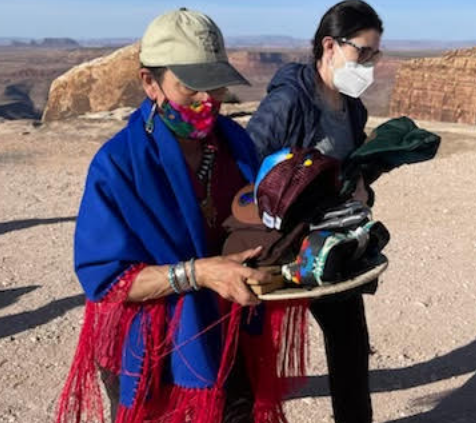
- Details
- By Andrew Kennard
WASHINGTON — The Washington Post reported on Monday evening that Interior Secretary Deb Haaland has submitted a recommendation to President Joe Biden return the Bears Ears, Grand Staircase-Escalante, and Northeast Canyons and Seamounts National Monuments to the sizes they occupied before drastic reductions were made by President Donald Trump.
Her recommendation is that full protections should be restored to the three national monuments, preserving about 5 million acres of federal land and water. The Post said Haaland’s report was confidential and its sources spoke on condition of anonymity.
Want more Native News? Get the free daily newsletter today.
The Inter-Tribal Bears Ears Coalition (BEITC) thanked Sec. Haaland for her work and recommendations.
“We are thankful that Secretary Haaland concurs with the Coalition’s assertion that former President Trump’s attempt to remove and replace the original Bears Ears National Monument was unjustified,” the coalition said in a press release Wednesday.
Native News Online previously reported about the great historical and cultural significance of Bears Ears to tribes and Trump’s reduction of its size by 85 percent in 2017. According to the Post, Trump also cut the Grand Staircase-Escalante National Monument by almost half its size and allowed for commercial fishing in the Northeast Canyons and Seamounts monument.
Utah’s congressional delegation sent a letter to President Joe Biden, asking him to meet with them and make Haaland’s report available to Congress before issuing a final decision.
“We appreciate your cooperation and willingness to engage thus far, and we again urge your administration to work with us to craft collaborative, consensus legislation that reflects the input of the people most directly impacted,” the delegation wrote. “It is past time to end the political back-and-forth that the communities in our state have been subjected to for more than 25 years, and you have a historic opportunity to do so by working with Congress.”
The BEITC calls for Biden to act now, saying that Utah legislators have not been open to working with the coalition in the past and that this is “nothing more than a stall tactic.”
“The Hopi Nation, with its historical and cultural ties to the Bears Ears National Monument, is anxiously and patiently awaiting a conclusive decision from President Biden, one that will correct the injustices done to us by the last president and his administration,” Hopi Vice-Chairman and BEITC Co-Chair Clark Tenakhongva said in the BEITC’s press release. “And it is my hope that once the Bears Ears National Monument has been restored, together, we can turn the page to a new and brighter chapter in the shared story of America.”
The BEITC also thanked Haaland for consulting with stakeholders during her visit to Bear’s Ears in her first month in office. The coalition is made up of the Navajo Nation, the Hopi Tribe, the Ute Mountain Ute Tribe, the Pueblo of Zuni, and the Ute Indian Tribe. It advocates collaborative land management between the coalition and federal agencies and protection of historic sites and cultural resources, among other objectives regarding Bears Ears.
More Stories Like This
Native News Weekly (August 25, 2024): D.C. BriefsUS Presidents in Their Own Words Concerning American Indians
Oral History Project Announces 14th Stop in Portland, Oregon: NABS Continues to Gather Crucial Stories Across Indian Country
Tunica-Biloxi Tribe Acquires GovStrive, Expanding Presence in Federal Workforce Solutions
Small-Dollar Donors Fuel Deb Haaland’s Historic Campaign for New Mexico Governor
Help us tell the stories that could save Native languages and food traditions
At a critical moment for Indian Country, Native News Online is embarking on our most ambitious reporting project yet: "Cultivating Culture," a three-year investigation into two forces shaping Native community survival—food sovereignty and language revitalization.
The devastating impact of COVID-19 accelerated the loss of Native elders and with them, irreplaceable cultural knowledge. Yet across tribal communities, innovative leaders are fighting back, reclaiming traditional food systems and breathing new life into Native languages. These aren't just cultural preservation efforts—they're powerful pathways to community health, healing, and resilience.
Our dedicated reporting team will spend three years documenting these stories through on-the-ground reporting in 18 tribal communities, producing over 200 in-depth stories, 18 podcast episodes, and multimedia content that amplifies Indigenous voices. We'll show policymakers, funders, and allies how cultural restoration directly impacts physical and mental wellness while celebrating successful models of sovereignty and self-determination.
This isn't corporate media parachuting into Indian Country for a quick story. This is sustained, relationship-based journalism by Native reporters who understand these communities. It's "Warrior Journalism"—fearless reporting that serves the 5.5 million readers who depend on us for news that mainstream media often ignores.
We need your help right now. While we've secured partial funding, we're still $450,000 short of our three-year budget. Our immediate goal is $25,000 this month to keep this critical work moving forward—funding reporter salaries, travel to remote communities, photography, and the deep reporting these stories deserve.
Every dollar directly supports Indigenous journalists telling Indigenous stories. Whether it's $5 or $50, your contribution ensures these vital narratives of resilience, innovation, and hope don't disappear into silence.
 The stakes couldn't be higher. Native languages are being lost at an alarming rate. Food insecurity plagues many tribal communities. But solutions are emerging, and these stories need to be told.
The stakes couldn't be higher. Native languages are being lost at an alarming rate. Food insecurity plagues many tribal communities. But solutions are emerging, and these stories need to be told.
Support independent Native journalism. Fund the stories that matter.
Levi Rickert (Potawatomi), Editor & Publisher

